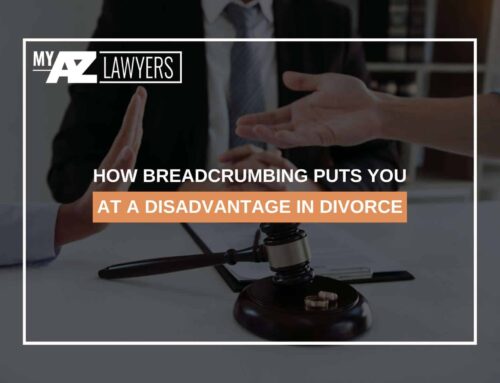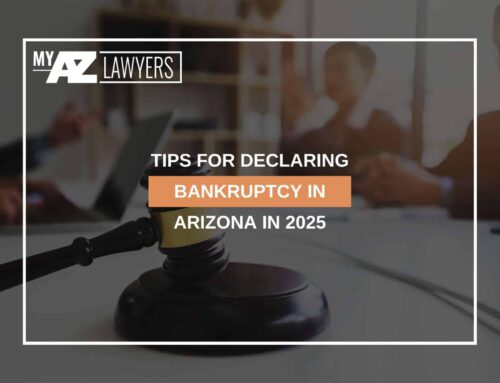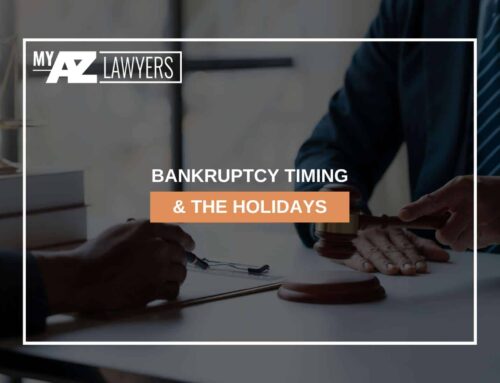Table Of Contents
How Long Will Bankruptcy Mess Up My Credit?
What Happens To Your Credit When You File For Bankruptcy?
Many people hold off filing bankruptcy because of the potential impact it could have on their credit. It is true that declaring bankruptcy can cause a drastic change in your credit score and comes with other long-term credit implications. However, it’s always important to consider the alternative in these types of situations- a repossession, foreclosure, judgment, and wage garnishment could also seriously damage your credit. Unlike bankruptcy, these alternatives will only make your financial situation worse. Read on to learn more about how bankruptcy might affect your credit, for how long, and other related considerations. If you have any additional questions or concerns, call 480-470-1504 for your free consultation with one of our experienced Arizona bankruptcy lawyers.

Your Credit Score Upon Filing Bankruptcy
Most of our clients assume that filing bankruptcy will cause their credit scores to immediately nosedive. However, this is only true if you have decent credit when you file. A debtor with a high credit score can expect to see a drop after filing their petition with the court. A debtor with a low to medium credit score might not see much change, or even a small improvement in their credit score. You can talk to a bankruptcy attorney for further details about how bankruptcy can affect your financial situation as a whole. Call 480-470-1504 to schedule your free consultation with a skilled Ahwatukee bankruptcy lawyer.
Standard Bankruptcy Periods
If you’re concerned about long-term credit impact when considering bankruptcy, there are some certain time periods you’ll want to know about before filing.
Filing a Second Bankruptcy
It may sometimes be beneficial to wait to file bankruptcy until someone’s financial situation has stabilized. Otherwise, they may continue to accrue debt after the bankruptcy. That person would need to wait a considerable time before enjoying bankruptcy’s full benefits again. The waiting periods between bankruptcy cases are:
- 8 years between a Chapter 7 and a Chapter 7
- 6 years between a Chapter 13 and a Chapter 7
- 4 years between a Chapter 7 and a Chapter 13
- 2 years between a discharged Chapter 13 and a Chapter 13
- 4 years between a dismissed Chapter 13 and a Chapter 13
Mortgage Waiting Period
While buying a home isn’t at the forefront of the minds of most people considering bankruptcy, it may be important to you that you will be disqualified from most home mortgages for 2 years after filing. Filing bankruptcy won’t disqualify you from renting, but that may be one of your only options after bankruptcy if you don’t already own your home.
How Long Does Bankruptcy Remain on My Credit Report?
The length of time that a bankruptcy filing remains on your credit report depends on the chapter you file. A Chapter 13 bankruptcy will remain on your credit for 7 years. A Chapter 7 bankruptcy will remain on your credit for 10 years.
What Might Happen to Your Credit Without Bankruptcy
For some people, self-negotiation, debt settlement, or debt consolidation could be more effective to deal with debts than bankruptcy. If you have a small amount of debt and can find a reputable representative for alternative debt resolution methods, bankruptcy’s disadvantages could outweigh its benefits.
These alternatives to bankruptcy work best when you have a relatively small debt load and the time to work things out with your creditors. If you have waited too long to address your debt situation, your creditors could be moving in on stricter methods of collection. These can include eviction, foreclosure, lawsuits, wage garnishments, vehicle repossession, utilities and services shutoffs, and more. These can have a severe negative impact on your credit just like bankruptcy, but could leave you without a home, car, hefty portion of your paycheck, and even electricity and internet. One of the reasons that bankruptcy could help your credit despite its implications for your credit is that the automatic stay will stop your creditors from pursuing all these types of actions.
Improving Your Credit After Bankruptcy
You aren’t just stuck with the credit score you arrive at after filing bankruptcy. There are several steps you can take to improve your credit after your case has been discharged. Many of them are similar to the steps you would take to improve your credit regardless of filing bankruptcy. In general, you need to make sure to pay monthly bills on time. Timely payments will start to build up a positive credit history after having your slate cleaned by bankruptcy.
- Review and possibly reconsider your auto loan. If you finance your vehicle and keep it in bankruptcy, your auto lender doesn’t have to report your timely payments to the credit bureau anymore. However, they can and will still report whenever your payments are late. Depending on your vehicle’s condition and how it suits your current needs, it may be time to trade it in. When you finance a vehicle after bankruptcy, the lender will be required to report your timely payments, which can help improve your credit score.
- Carefully consider a new credit card(s). All of your credit cards will be frozen and closed when you file bankruptcy. That doesn’t mean you will be stuck without a credit card forever. You can expect to be flooded with offers for new credit cards shortly after your case is discharged. Not all of these offers will come with the best interest rates, annual fees, and other terms. You should review these credit card offers extremely carefully, no matter how attractive the sign-up bonuses they offer are. These short-term incentives could come with hidden drawbacks that could cost you far more in the long run, and in a time when your credit is vulnerable from a recent bankruptcy.
- Look for options to enroll in credit reporting. Some of your monthly expenses, like rent, streaming services, and cell phone services come with the option to include credit reporting. That means that if you pay your bill on time, it will be reported to the credit bureau and contribute to a positive credit history. This comes with the disadvantage that if you make late payments, this can hurt the credit you are trying to rebuild.
- When paying for bankruptcy with a payment plan, look for credit reporting as well. Many attorneys will advertise payment plans for their legal fees. It’s important to observe whether these are pre-filing or post-filing options. Paying for your installments can make it more affordable but may not do you any good if your balance still needs to be paid in full before filing your petition (and potentially reducing your debt-related expenses.) If you qualify for your attorney’s post-filing payment plan, see if it includes credit reporting so those timely payments can help improve your credit.
Affordable and Reliable Arizona Bankruptcy Lawyers
A good bankruptcy attorney can make sure that you are prepared both for your bankruptcy filing and for your life after bankruptcy. A bankruptcy petition filed improperly could result in a stressful case that doesn’t result in full benefits for the debtor. Our firm offers reputable bankruptcy representation with payment plans that make filing bankruptcy more affordable. Our post-filing payment plans include a zero percent interest rate and credit reporting. Contact us today to see if you qualify at 480-470-1504.
LISTEN TO THE PODCAST VERSION OF THIS ARTICLE
Arizona Offices:
Mesa Location:
1731 West Baseline Rd., Suite #100
Mesa, AZ 85202
Office: (480) 448-9800
Email: [email protected]
Website: https://myazlawyers.com/
Phoenix Location:
343 West Roosevelt, Suite #100
Phoenix, AZ 85003
Office: (602) 609-7000
Glendale Location:
20325 N 51st Avenue Suite #134, Building 5
Glendale, AZ 85308
Office: (602) 509-0955
Tucson Location:
2 East Congress St., Suite #900-6A
Tucson, AZ 85701
Office: (520) 441-1450
Avondale Location:
12725 W. Indian School Rd., Ste E, #101
Avondale, AZ 85392
Office: (623) 469-6603












